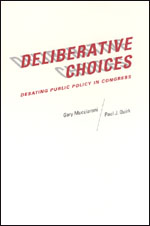Half-truths in Congress

We’ve filed this blog post under “Books for the News”— and quite appropriately it seems considering all the media attention this book has been receiving lately. With the air heating up around the midterm elections, Gary Mucciaroni and Paul J. Quirk’s eye-opening study of the claims made in Congressional debates has the journalists buzzing. A column by Richard Morin in the September 6 Washington Post has been republished and/or referenced by at least five other publications including The Chicago Tribune, while the Providence Journal published another article that has trickled down into several more publications around the country. Here’s a taste of what’s got them talking, from Morin’s WP column:
Members of Congress tell the whole truth only about a quarter of the time when debating major legislation on the floors of the House and Senate. Instead, legislators mostly rely on half-truths, misleading exaggerations or outright inaccuracies when debating the nation’s business, according to two political scientists who have studied the quality of debate in Congress. … [Mucciaroni and Quirk] sifted through the Congressional Record to identify key claims made by each side to support its case and to rebut the assertions of opponents. They also compared the claims with available data to see whether they were true, false or somewhere in between. In all, they examined the accuracy of 18 claims in 43 separate House and Senate debates.
The whole truth and nothing but the truth, 25% of the time. The balance is half-truths, omissions, and sometimes even outright falsehoods. Nonetheless, at the core of this interesting and timely study, the authors believe that it’s possible to improve congressional deliberation, and they recommend reforms designed to do so.
Want to make a more informed electoral decision? Pick up a copy of Deliberative Choices: Debating Public Policy in Congress before November.